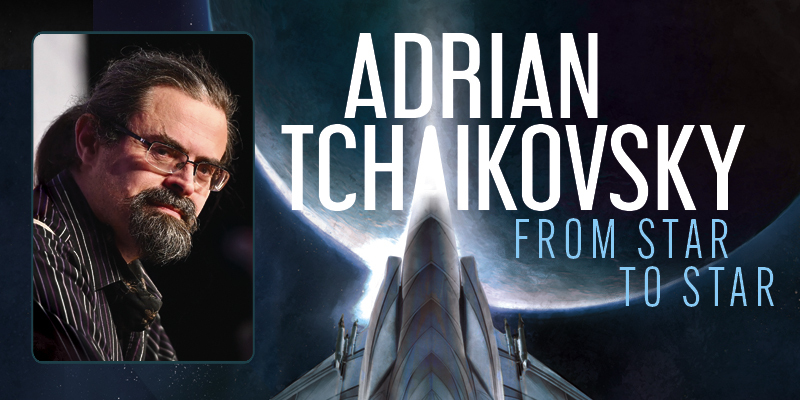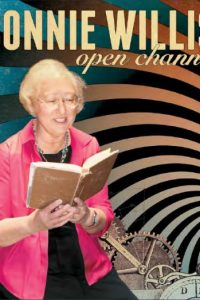Adrian Tchaikovsky: From Star to Star
 Adrian Czajkowsk, who writes as ADRIAN TCHAIKOVSKY, was born June 4, 1972 in Woodhall Spa, Lincolnshire, England. He attended the University of Reading, where he studied zoology and psychology. He worked as a legal executive until becoming a full-time writer in late 2018.
Adrian Czajkowsk, who writes as ADRIAN TCHAIKOVSKY, was born June 4, 1972 in Woodhall Spa, Lincolnshire, England. He attended the University of Reading, where he studied zoology and psychology. He worked as a legal executive until becoming a full-time writer in late 2018.
Tchaikovsky began publishing with fantasy novel Empire in Black and Gold (2008), first in the ten-book Shadows of the Apt series, concluded with Seal of the Worm (2014). Stories related to the Apt are collected in Spoils of War (2016), A Time for Grief (2017), and For Love of Distant Shores (2018).
He is perhaps best known for Arthur C. Clarke Award-winning SF novel Children of Time (2015) and its British Science Fiction Association Award-winning sequel Children of Ruin (2019), with a third volume, Children of Memory, expected later this year.
The Echoes of the Fall fantasy series includes British Fantasy Award winner The Tiger and the Wolf (2016), The Bear and the Serpent (2017), and The Hyena and the Hawk (2018). The Dogs of War books is Dogs of War (2017) and Bear Head (2021). BSFA Award winner Shards of Earth (2021) began the Final Architecture series, with sequel Eyes of the Void forthcoming.
His standalone novels include British Fantasy Award finalist Guns of the Dawn (2015), Spiderlight (2016), Clarke Award finalist Cage of Souls (2019), and Sidewise Award-winner, Philip K. Dick Award finalist, and BSFA nominee The Doors of Eden (2020).
Tchaikovsky is an accomplished author of novellas, among them Ironclad (2017), The Expert System’s Brother (2018) and sequel The Expert System’s Champion (2021), Walking to Aldebaran (2019), Made Things (2019), Firewalkers (2020), One Day All This Will Be Yours (2021), Elder Race (2021), and Ogres (2022). Some of his short fiction is collected in Feast and Famine (2013) and Short Changes (2020).
He has also written for the After the War and Afterblight Chronicles shared worlds, and for Warhammer 40K.
Tchaikovsky lives in Leeds with his wife and son.
Excerpt from the interview:
“When I was growing up, the idea of being a writer seemed absolutely ludicrous. I’ve always been a storyteller, but for quite a long time my outlet for that was roleplaying games. I first encountered proper roleplaying games around age 12 or 13, and I’ve not really stopped since. I was a game master for Dungeons & Dragons and that kind of thing. There was a series of books called the Dragonlance Chronicles brought out by TSR, the D&D publisher, that were basically just a writeup of someone’s D&D campaign. That kind-of bridged across what would otherwise, I suspect, have seemed an insuperable gap between normal persons such as myself and people who write books that get published and other people read. Once I read those, writing books basically became the thing I wanted to do. I was about 17 or 18 at that point; before then it wouldn’t have seemed a possible or credible ambition.
“Roleplaying is a phenomenally good training ground for a number of writing skills. The worldbuilding is a big part of that – when you’re building a world for players to romp around in, you actually have to be considerably more thorough than you necessarily would when just building a world for a book. That gives you the best practice of making a very robust world that can deal with people going anywhere in it, and a world that is immersive and always has somewhere else to go. That’s very important to me as a writer, and as a reader that’s also what I look for. I like the idea of a world that feels real and is bigger than the book. You certainly get fantasy worlds where, at the end of the book, everything has been explored – where the world is essentially constructed to tell the one story the book or the series is about. That is unsatisfying to me. I need the sense that the world goes on, and I think that’s one reason why people like, especially, the fantasy genre so much; it’s one reason why people want to go back to Middle-earth and Earthsea and all of these other places so much. The place itself has a life over and above the story, and over and above those individual characters. Creating a setting for roleplaying games it very good practice for that. The other thing is, if you are a game master, you get to practice taking on the roles of a rapid succession of varied characters, which helps you write different voices and create large-cast books more easily than would otherwise be the case.
“I was always a science fiction/fantasy reader, certainly, and obviously the games I went on to play were very much SF and fantasy games. Encountering the Dragonlance books really was just like flicking a light switch on, or opening a door.
“I have a lot of books out lately, but some of that is just an odd effect of things getting delayed and then coming out in quick succession – obviously, when something comes out does not necessarily reflect when it was written. Some things are hitting the shelves a couple of years after the first draft was concluded. It takes me about six months to write a full-length novel first draft; it takes me about a month to write a novella first draft. Novellas don’t have that long dragging middle that I often find when writing a full-length novel. That’s always the slow trudge; a novella is basically just a beginning and an end, so I can write novellas extremely efficiently. I think six months for a first draft is probably not that unusual for a professional writer. It took me nine months or so when I was also holding down a day job.
“If there is a secret, it’s that I plan most of my books fairly heavily. That’s probably one reason why my first draft is very close, in most cases, to my submission draft. I don’t go back and have long rewrites, and I don’t do two or three completely separate drafts from the ground up. In that way, I can get things written and submitted and go on to new projects, rather than spending a very long time on each book, tinkering around with it. That approach doesn’t always work, and there have certainly been a couple of books where I’ve gone massively off the rails partway through. At that point, because I’m not a particularly good improviser, that can be a real problem, because it takes me a while to work out what’s going on and how to fix it. Whereas, if I were used to writing on the fly, I expect that would come a lot more naturally. Recently, I wrote one book where I worked the world out but let the plot kind-of unravel for itself, and that seems to work nicely. I guess I won’t know until people actually get to read it.
“It’s incredibly difficult to get any idea of how well something has done; publishers tend to be very slow to tell you how things are selling – because if they say it’s doing great, then they’ve just given you a great big stick to hit them with next time you negotiate a contract. Even publishers can’t necessarily get straight facts from Amazon or other places about what’s being sold, especially non-physical copies. The stuff you see online is hard to trust because they know there’s always a bit of an echo chamber, and just because you’re seeing all the good stuff doesn’t mean the bad stuff isn’t out there. It’s really very hard to know anything for sure.
“The big question tends to be – and it obviously only comes up a year or so after the book comes out, quite possibly – do the publishers want you to do another book with them? If they do, then I guess the previous one must have done all right.
“The fantasy series Shadows of the Apt was the first thing I wrote; I started with the first four books, simultaneously a complete series and also the jumping-off point for a longer series. My agent was able to get the books shoehorned onto the Pan Macmillan list in 2007, 2008. There was a very narrow window, frankly, when the big names everyone was excited about were George R.R. Martin and Steven Erikson. At that moment, the idea of, ‘Yeah, why not do this enormous ten-book series of big fantasy books?’ didn’t seem like a crazy idea. That series got sent in at exactly the right time, and I don’t think I’d be allowed to do a ten-book series anymore. I certainly wouldn’t recommend it; go in with a trilogy, maybe. Going in with a ten-book series will probably look a bit ambitious to most publishers these days.
“I knew the series was at least four books, and I knew I wanted to do more. In fact, what happened was I just kept writing them until I’d done ten. I never really thought about the possibility that they wouldn’t want to take books seven through ten. It was a bit like, you get to the end and realize you’ve been walking a tightrope across an enormous chasm without realizing that was what you were doing.
“At the time, I think it was a bit of an expansion phase, certainly within UK publishing. There were an awful lot of new authors being taken on, and an awful lot of new series coming out, and then there was a big crunch around about the end of when the last few books of Shadows of the Apt were coming out. A lot of authors didn’t get their contracts picked up again. A lot of series didn’t even get finished. Until I saw that, I honestly hadn’t realized such a thing could happen, because I thought, ‘Surely there’s this gentlemen’s agreement between the readers, the writers, and the publishers that this series will have a conclusion.’ As a reader, that’s what you expect.
“What happened then was that I had another couple of books out: Guns of the Dawn and the Tiger & the Wolf series, and they were all doing just about okay. I was very much in the midlist. I grew up reading science fiction, and I wanted to write a science fiction book as well as all of this fantasy stuff. I decided I would do a science fiction book and then go back to the fantasy because that’s the bread and butter. I guess I had this crazy idea, ‘I’m going to write a book about giant spiders in outer space.’ I think it was basically just luck that the publisher at Pan Macmillan said, ‘We better just humor him and let him do this weird spider book and get it out of his system, and then we can go back to the swords and things.’
Interview design by Francesca Myman.
Read the full interview in the May 2022 issue of Locus.
 While you are here, please take a moment to support Locus with a one-time or recurring donation. We rely on reader donations to keep the magazine and site going, and would like to keep the site paywall free, but WE NEED YOUR FINANCIAL SUPPORT to continue quality coverage of the science fiction and fantasy field.
While you are here, please take a moment to support Locus with a one-time or recurring donation. We rely on reader donations to keep the magazine and site going, and would like to keep the site paywall free, but WE NEED YOUR FINANCIAL SUPPORT to continue quality coverage of the science fiction and fantasy field.
©Locus Magazine. Copyrighted material may not be republished without permission of LSFF.







